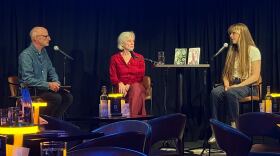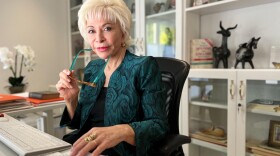A new book is shining a light on an unusual chapter in the life of the founder of Christian Science, Mary Baker Eddy.
In the second half of the 19th Century, the New Hampshire native was a wealthy and prominent public figure. But toward the end of her life, Eddy faced a legal challenge to her wealth and her fitness to manage her own affairs – and it came in part from inside her own family.
Historian Peter Wallner is the author of the book Faith on Trial: Mary Baker Eddy, Christian Science and the First Amendment. He previously wrote an acclaimed two-volume biography of New Hampshire’s only US president, Franklin Pierce. Wallner will speak about the book Wednesday afternoon at the New Hampshire Historical Society in Concord.
Mary Baker Eddy is in her mid-eighties when this suit begins. How would you describe her at this stage in her life, as well as the public attitudes toward her and toward Christian Science?
She was considered by Mark Twain and others to be the most famous woman in America at this time. She had moved to Concord in 1889 from Boston, and at that time, people thought she was moving into semi-retirement. She was very much in charge of her life and her church, but nevertheless because she was so difficult to get in contact with, especially for the media or even for her adopted son and her biological son, there was some sense that maybe she was not competent and that maybe she was being held under control by Christian Science church officials, who were somehow misappropriating her wealth and controlling what they thought might be an incompetent old woman. She was far from that.
Eddy’s sons play roles in this lawsuit. What are they looking to do?
That's an interesting point. I think they had different motives. Her biological son had been estranged from her for many years; he had been taken away from her as a child, raised by people in Minnesota, and he had become an illiterate prospector. He needed her money; he wanted her wealth.
Her adopted son was out for revenge, because he felt his relationship with his stepmother had been undermined by Christian Science officials, and so he'd been sort of drummed out of the Christian Science church and out of Mary Baker Eddy's affections. So he joined the plaintiffs in the case, I think largely to get revenge on Christian Science officials.
That, then, becomes the crux of the case - it's not so much about whether Mary Baker Eddy can handle her own affairs, but Christian Science itself.
Yes. And that wasn't even the motives of the son or adopted son, that was the motives of the press and the lawyers in the case. They were out to discredit Christian Science; they thought the religion itself was dangerous, that it was against science, that it believed in health care by mental reasons rather than by physicians. And they thought that Christian Science itself was dangerous. So they used, in many cases, the son and adopted son for their own purposes, which was to get at Christian Science.
How does that play out in the courtroom? How do lawyers essentially try to put this school of religious thought to the test?
What Eddy did was very smart. Over a time, she and her lawyer, Frank Streeter, from Concord, had a media campaign in which they brought in reporters and psychiatrists to study her and to interview her. Reporters and photographers came out in the press with stories that said she was quite sane and quite in charge of her life. So by the time the case went to court in August of 1907, it was pretty obvious to the plaintiffs that she was at least going to make a decent showing if she was interviewed by the court. Therefore they turned their attention entirely to her views on religion, claiming that they showed her delusions and showed her to be insane or suffering from senile dementia.
In the end, the judges were not going to listen to a lot of talk about her religion. They simply did not believe you could connect a religion to the fact that she was incompetent. So they ruled out all evidence prior to 1890 - and most of the witnesses that the plaintiffs had gathered were people who knew her in her early days of Christian Science, when her religion did seem to be somewhat superstitious in many ways. She had changed her views quite a bit by 1906, 1907. Nevertheless, the court had ruled out all of the testimony prior to 1890, and in doing so the plaintiffs were left without much of a case. So they asked the court to dismiss the case, they dropped the charges. And they did this partly because they felt it would be easier to prove that she was incompetent and insane after she died. Therefore, they would challenge her will.
And she did live for several more years.
She lived until December 1910; she died at 89 1/2. She was in Massachusetts at that point; she left Concord immediately after the case was over, feeling somewhat vulnerable at Pleasantview (Retirement Community), because of the fact that the home was so close to the road. Reporters and photographers were always camped out in front of her house.
And what happened to her sons after this?
They eventually did settle with her, the [biological] son was granted $245,000 by her to try to fend off any possible challenge to her will, because she wanted to leave her money to Christian Science, for the growth of her church. And she gave her adopted son $45,000 - it doesn't sound like a lot today, but of course in 1907 it was quite a bit of money.
Nevertheless, when she died, they still challenged her will. In both cases, of course, they failed again to challenge her will and they had to accept the $245,000 and $45,000 settlements that she had given.
Does this case set any precedents or have any lasting effect in our legal system about how religion is treated when it comes to someone's competence?
I think it does in the sense that basically the courts, in 1907, decided that anything regarding someone's religious beliefs was simply not subject to legal court action. It was basically decided that there was nothing about her religion that was relevant to whether or not she was a competent person or whether or not she was in charge of her religion. The court simply refused to deal with that; they simply accepted the idea that people could believe whatever they wanted. It didn't necessarily affect their competency to handle their financial affairs or their daily lives.
What do you think you've learned about Mary Baker Eddy from studying this episode in her life?
I didn't come away believing in Christian Science, particularly, but I thought she was at least a very honest person in what she believed in. She truly believed everything she said, and she began a church that other people have followed as well.







